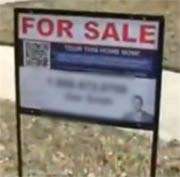Could poor math skills raise your risk for foreclosure?

Borrowers who struggle with math are more likely to fall behind on their mortgage payments and face foreclosure than those who have stronger financial skills, new research suggests.
The study results offer a provocative new reason for the 2008 subprime mortgage crisis: Borrowers who got into trouble weren't simply the victims of tricky or unfair loans. It could have been that they also didn't have the math skills to manage their personal finances through difficult economic times.
"I think this is a very important paper," says Annamaria Lusardi, a professor of economics and accountancy at George Washington University in Washington, D.C.
"We have to make a lot more financial decisions than in the past, and we have to be equipped to make those decisions," said Lusardi, an expert on financial literacy who was not involved in the research. "Financial literacy is missing in our schools, and I think as a result, we're not equipped to make decisions about complex financial products."
For the study, which is published in this week's issue of the journal Proceedings of the National Academy of Sciences, researchers used proprietary data collected on subprime mortgage borrowers in New England in 2006 and 2007 to examine the details of the types of loans they took out on their homes and their payment histories.
They then called about 300 of those borrowers and asked questions about their financial situations, including their household income, age, education, marital status and credit score. They asked a set of questions designed to assess general intelligence. Finally, in a test that might strike fear in the hearts of arithmophobes everywhere, they threw in a set of word problems designed to test a person's ability to do basic calculations.
"There were five questions, and they got more and more complicated," said study author Stephan Meier, an associate professor at Columbia Business School. "The simplest one was: There is a sofa that costs $300 when it's full price, and it's on sale for half the price. How much is it on sale?"
Next up: There's a disease, and the probability of getting the disease is 10 percent. How many people out of 1,000 got the disease?
The researchers found that people with less mathematical ability were more likely to fall behind on their mortgages than those who were better at math. Only 7 percent of people with the highest scores on numerical ability ended up in foreclosure, compared to 20 percent of those who were not as good with numbers.
That was true even when the researchers took into account other factors that might impact a person's ability to pay their bills, such as total income and credit score. In fact, a person's credit score when they took out their mortgage wasn't related to later default.
In the second phase of the study, researchers tried to understand why numerical ability was tied to mortgage default.
"We had this hypothesis that people who are not so good with numbers will have problems with decisions that involve a lot of numbers, which are mortgage choices, which we all know are terribly complicated," Meier said. For example: "Something went wrong when they bought their mortgage. They had too big of a mortgage, they leveraged too much."
But that wasn't what happened.
People with high numerical ability appeared to have the same mortgage terms as those with low numerical ability.
Researchers think borrowers with low numerical skills got into trouble after they took out their mortgages because they weren't able to manage other aspects of their personal finances as well as people who were more comfortable with numbers.
"Say you have a mortgage and suddenly you get hit by an income shock. How you can weather such a shock is that maybe you have some savings on the side ... or you need to re-budget," Meier said. "People who are not so good with numbers may be bad at doing that, and it's really outside the mortgage choice."
That's just an educated guess, however. The study wasn't designed to prove that low numerical ability caused people to default on their home loans. It just suggests a relationship between the two. There could be other variables that weren't measured by the study that could have impacted the results.
People who are bad at math can at least take comfort in one finding from the study: Struggling with math doesn't indicate lower intelligence. Numerical ability doesn't seem to be tied to IQ.
Still, the study adds to a growing body of evidence suggesting that the ability to make sound financial decisions is linked to the ability to understand math and be comfortable with certain calculations.
"There's evidence that financial literacy affects behavior in other dimensions, very similar to this one," said Lusardi, who is campaigning to get more schools to add financial literacy to their curricula. "It's important for savings for retirement and for paying off credit cards, and we see the links to financial literacy in those behaviors as well. These things really do matter."
More information: "Numerical ability predicts mortgage default," by Kristopher Gerardi, Lorenz Goette, and Stephan Meier. PNAS, 2013. www.pnas.org/cgi/doi/10.1073/pnas.1220568110
For more on financial literacy and why it matters, head to the U.S. Department of the Treasury.
Journal information: Proceedings of the National Academy of Sciences
Health News Copyright © 2013 HealthDay. All rights reserved.

















